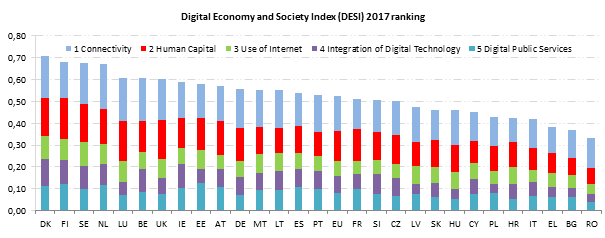Denmark tops the Digital Economy and Society Index 2017, providing excellent opportunities for testing and developing new technology.
Denmark is the most digital country among the 28 EU member states according to the Digital Economy and Society Index (DESI) 2017. Finland is ranked second and Sweden is third.

94% of Danish citizens are online and actively engaged in the use of a variety of online services, making their digital skills highly advanced. The Digital Economy and Society Index highlights Denmark as particularly strong in the delivery of online public services.
Danish business gone digital
Denmark also takes the lead in the use of digital technologies by businesses. More and more businesses have taken up cloud computing, eInvoicing and social media. Furthermore, electronic sales by small and medium-seizes enterprises are high.
Denmark provides a fast broadband (NG) cover and take-up of fast connections is also continuously increasing well above average European levels. Furthermore, Denmark features the widest 4G coverage.
“Denmark being named the most digital country in the EU proves that Denmark provides excellent conditions for international tech companies looking to test and develop new IT solutions. Not only does Denmark offer world-class IT infrastructure, it also offers consumers willing to play an active part in developing new technologies. Furthermore, Danish organisations show a strong ability and willingness to embrace new technologies and transform working procedures. These have been some of the key drivers behind recent investments from major tech players such as IBM and Singularity University, who both have announced that they are opening innovation centres in Denmark,” says Lasse Grøn Christensen, ICT Team Leader, Invest in Denmark.
Other Nordics
Finland
Finland ranks 2nd in DESI 2017. Finland is among the most digital countries worldwide. It scores very well in four out of five dimensions, with a particular strength in digital skills where it is ahead of all other Member States with some distance. It is also very strong in digital public services.
Connectivity: Finland's connectivity score is only average, mostly due to the low adoption of fixed broadband, which is in turn closely related the high adoption of mobile broadband.
Human Capital: Digital skills are the greatest relative strength of Finland. In particular, Finland has a very high share of ICT specialists, while also scoring well in basic skills and STEM graduation rates.
Use of Internet: The use of Internet services is widespread in Finland, with a leading position in online banking which is close to being universally adopted.
Integration of Digital Technology: Finnish businesses are eager adopters of digital technologies, in particular regarding cloud computing and eInvoicing, although SMEs' online sales cross-border are more limited.
Digital Public Services: Finland's online provision of public services scores very high, even if progress made on Open Data last year was lower than the EU average.
Sweden
Sweden ranks 3rd in DESI 2017. Sweden scores well in all dimensions. It ranks the highest in the use of internet by citizens (2nd). Sweden is among the best performing countries worldwide and its main challenge is to continuously improve its already high levels of digitisation.
Connectivity: Sweden has high rates of mobile broadband take-up and the Swedish market is characterised by rapidly growing consumer demand for fast broadband. A great challenge is to further improve NGA coverage given the difficult geography.
Use of Internet: Over the past year more Swedes have been using the internet to read news, listen to music, watch films and TV-programmes, make calls as well as use social media.
Integration of Digital Technology: Swedish businesses use digital technologies to improve efficiency, productivity and sales. They are adopting cloud computing, selling online, using electronic invoicing and social media to communicate with their customers.
Digital Public Services: Sweden is above the EU average with regard to the digitisation of public services and their uptake. However, the country lags behind in its open data strategy.
Source and graphics: europa.eu and www.investindk.com



 EUR 4.2634 zł
EUR 4.2634 zł USD 3.6137 zł
USD 3.6137 zł DKK 0.5714 zł
DKK 0.5714 zł SEK 0.3787 zł
SEK 0.3787 zł NOK 0.3586 zł
NOK 0.3586 zł